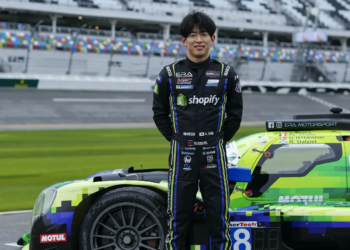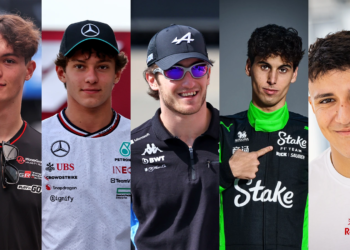It has been one year since John Doonan was appointed to succeed Scott Atherton as president of IMSA, and in his first year has been burdened with the not insignificant task of guiding the championship through the COVID-19 pandemic. Doonan says he feels positive about his first year as leader of the organization, despite the huge challenges.
“I knew that I was entering a place that had a terrific team of personnel already on the roster,” Doonan said I was inheriting that and thank goodness for that. What we turned the corner into after the Rolex 24 tested everybody’s wits and everybody’s strengths.:
But I come into this weekend’s race feeling really positive. We have a ton of momentum right now despite everything we’ve faced, and so I actually feel quite positive.
“We took what is traditionally a schedule with a lot of date equity that is sort of evenly spread out, kicking off with the Rolex and 45 days later you’re racing at Sebring and then you come out to the West Coast for Long Beach. We have a really good cadence in our schedule, but we’ve had to recast it, based on all the state mandates and lockdowns and things like that.
“We’ve pushed a lot of these events from July 4 into the middle of November when a week or so ago at Petit Le Mans, we would have been finished with the season.
“So it’s definitely not been for the faint of heart, but we’ve really persevered and have so many positive things that have come out of this that I think that is what has kept everybody so energized.”
Unlike the majority of other championships, IMSA had already gotten its 2020 season underway when the pandemic struck. The Rolex 24 at Daytona, held in January, took place before the virus disrupted racing around the world from March onwards. Doonan reflects on the challenge of having to overhaul the entire post-Daytona schedule, likening it to the sport he oversees:
“It’s maybe a little emotional analogy, but in an endurance race, teams face all kinds of adversity,” he said. “Things rarely go absolutely perfect. And that’s really sort of the mentality I grew up with because my dad was a sports car racer – only on an amateur basis – but that’s what we’ve had to do. We’ve had to adapt and overcome.
“We’ve had to readjust, rethink our schedule, rethink the way we go about it. Thank the Lord for our medical liaisons and the terrific relationships with AMR (American Medical Response). Those folks have helped us develop a set of medical and event protocols in conjunction with our colleagues at NASCAR that have allowed us to run all these race events in a safe manner and get all our competitors back in the U.S.
“Forty percent of our paddock comes from outside the United States, so thank goodness for Homeland Security and U.S. Customs and Border protection and the relationship we now have with them because they made it possible.
It’s been a great learning experience even though I’ve been around the sport for all these years. We’ve learned an absolute ton in the last 12 months.”

Community brought closer together
While the pandemic brought some never seen before challenges to the series, Doonan believes that it also had some positive effects.
“There’s no question our community is tighter – the teams, the relationship we have with the teams on the IMSA side, the auto manufacturer partners, our partners like Michelin and WeatherTech,” the former head of Mazda Motorsports expIained. “I think we’re a tighter unit because everybody has just had to adapt from different schedule challenges with potentially separating ourselves a little more in the event space. Just doing things differently.
“But everybody embraced it right away when we went back to racing July 4 in Daytona. Outside of wearing their masks and doing all the proper protocols, it’s been business as usual once we’ve gotten into the paddock and executed the races.
“And you know, when competitors are complaining about things like the BoP (Balance of Performance), you know we have not skipped a beat,” Doonan said laughing. “They are all racers and they haven’t lost that, for sure.”
When asked what he considers to be his biggest point of pride, Doonan is adamant:
“For sure, the ability for all of us to get back to racing. I think it was March 12 when travel bans began to hit and stay-at-home orders went into effect. I think all of us were concerned, what does this mean state-to-state for our promoter partners? Will they be able to hold events? Will they be able to hold events with fans? Will they have to cancel events completely?”
I would say being able to get back to racing, for all of us was probably the biggest priority and biggest accomplishment.
“One of the things I’m really proud of is the ability to get our international participants back to the U.S. We literally had meetings face to face – with masks on – with the Department of Homeland Security and Customs and Border Patrol to say, “Look, we have a lot of participants outside the U.S. They are all top-level athletes in their sport whether they are a driver, an engineer, a mechanic, and we want to be able to get them back in the U.S. to be at our events. What can you do to help us?”
And they have been tremendous partners. Knock on wood, we have not had a single participant turned away. There have been a few late-night phone calls to help some people. But everyone’s been able to get back and forth safely, so we’re really proud of that.”

We did it
IMSA returned to the track on July 4th, with a sprint round at Daytona, the same venue that had hosted the season opener six months prior. Doonan says it was the result of a collaboration with numerous partners, not in the least including NASCAR. According to him, the existing relationships from his time at Mazda was of benefit during his and IMSA’s efforts to return to racing.
“One of the things I really appreciated was I had a relationship with so many of the folks at IMSA already from being a competitor, so there weren’t a lot of icebreakers needed in that regard.
“From being in endurance sports car racing, you’re used to facing a lot of challenges. We tried to break it down to No. 1, do we have events? No. 2, what are we going to need to do to rethink how we have events – from the way people enter the track, to medical screenings and temperature checks? My first call, frankly, was to our medical liaison asking, “OK, should I be worried? And if not, you tell me when I should be.” And they really helped.”
“Certainly, the collaboration with NASCAR [was beneficial]. They were the first to go back of any professional sport, which we have a lot to be proud about in Daytona. But it was just methodical.
We set up a Back to Racing Task Force at IMSA and ended up having nearly daily conference calls to start off. Then it weaned back to every other day and then once a week. It was just methodical.”
“IMSA, really our core business all these years has been to execute professional sports car events at the highest level. We didn’t forget how to do that, we just had to transform the way we’ve been doing it in a difficult environment.
Really, just being methodical and staying calm. Because every time you’d wake up and have a plan for the day – in the early months – you thought you had everything done and by noon there was a different date or you could not have fans, or you could have only so many fans.”
“It really challenges the business model of how we go about it, but in the end, it’s all about relationships, partnerships and communication. And I think we’ve done a particularly good job of working together with our stakeholders be it the race teams, be it our media partners, track promoters and all the other sponsors that allow us to be able to do what we do.”
And we did it in the end. Those are the key words: We did it.
“I feel very fortunate and honored that Mr. (Jim) France (IMSA chairman) and Mr. (Ed) Bennett (IMSA CEO) gave me the opportunity to lead the team. We’re going to keep pushing hard and I think three or four years down the road we’re going to look back and realize we weathered perhaps the most difficult storm anyone could have imagined in their careers. And that will be a proud moment as well.”










